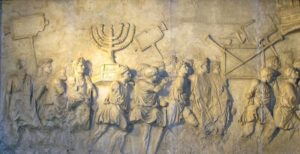The Fast That Failed
 God’s prophet warned them: their fast was fruitless.
God’s prophet warned them: their fast was fruitless.
But “hearts like flint” doomed them to repeat their dark history.
This post on the Fast of Tammuz is the eighth in a series on Divine Appointments: Insights from God’s Calendar. Nothing in the Bible is “old news”!
And here we go again! I started out with a plan to write about one thing, but somehow as I sought the Lord this morphed into something else.
Essentially, we’ve been seeking insights from God’s Word while walking through the Hebrew calendar. I’m writing this on July 11, or Tammuz 17 in Hebrew-calendar-speak. The date on which the Jewish Fast of Tammuz falls this year. This is one of four fast days on the Jewish calendar commemorating aspects of the Babylonian exile and the loss of the First Temple.
Summer Weeks of Sorrow
This fast on Tammuz 17 kicks off a period Jews know as the Three Weeks of Sorrow. So while the summer is bright and the days are long, the Jewish people are reminded to mourn some of their history’s darkest hours. Even the Holocaust fits into the picture, since the Exile ultimately set the stage for its horrors.
Here’s the background, from the Hebrew4Christians.com articles on the Fast of Tammuz and the Month of Tammuz:
Tablets Smashed on Tammuz 17. Moses smashed the tablets on the seventeenth day of the month of Tammuz, after he came down from Sinai and found the people worshiping the Golden Calf. This tragedy was seen as prophetic….
First Temple Sacrifices Halted on Tammuz 17. Beginning with the summer solstice, the Sumerians marked the decline in daylight hours with a six-day funeral for [their sun-god] Tammuz, and this idolatrous custom was apparently adopted by some Jews during the days of the First Temple. Ezekiel forewarned that the Temple would be destroyed if the people refused to repent… (Ez 8:14-18) Tragically the idolatry persisted despite the prophet’s warnings, and on Tammuz 9 the walls in Jerusalem were breached by Nebuchadnezzar’s armies. Because of the siege, on Tammuz 17, the Temple service was disrupted [NOTE: for the first time since the Tabernacle was constructed in the wilderness!] due to a lack of animals required for the sacrifices. The temple itself was destroyed three weeks later, on the Ninth of Av.
Jerusalem’s Walls Breached by Titus on Tammuz 17. It was also on Tammuz 17 that Jerusalem’s walls were breached by the Romans under Titus, leading to the destruction of Herod’s Temple in 70 A.D.
The anniversary of the Temple’s destruction is also commemorated with a fast (Tisha B’Av), the two fast days serving as bookends for the Three Weeks of Sorrow.
Jewish tradition marks these three weeks as a period of mourning, and the weekly readings from the prophets all warn the people about imminent judgment from heaven. Spiritually, the season is marked by a renewed call for teshuvah (repentance)…
 Titus’ victory procession with spoils from Herod’s Temple.
Titus’ victory procession with spoils from Herod’s Temple.
Reproduction of a famous frieze on the first-century
Arch of Titus in Rome. Photo by Sodabottle
(Own work) via Wikimedia Commons.
But here’s an odd thing that strikes me… If you look for these fasts in Scripture, you’ll find them mentioned in just one place, Zechariah 7 through 8.
Now the town of Bethel had sent Sharezer and Regemmelech and their men to seek the favor of the Lord, speaking to the priests who belong to the house of the Lord of hosts, and to the prophets, saying, “Shall I weep in the fifth month and abstain, as I have done these many years?” (Zech 7:2-3)
Zechariah ministered to the remnant who had returned from Babylonian exile and were about the business of restoring the Temple and resettling the Land. Bethel, a town about twenty miles from Jerusalem, had sent a delegation to question the prophet about the “fast of the fifth month”—the Fast of Tammuz. It seems the people had begun an annual fast to mourn the loss of the First Temple soon after they first went into exile. But now that some were back in the land, and the Second Temple was under construction, should they continue to fast?
The Prophet Weighs In—Sort Of…
The fascinating thing is that Zechariah responds to them for a chapter and a half—without ever directly answering their question!
Then the word of the Lord of hosts came to me, saying, “Say to all the people of the land and to the priests, ‘When you fasted and mourned in the fifth and seventh months these seventy years, was it actually for Me that you fasted?’ ” (Zech 7:4-5)
God seems pretty unimpressed with their fast! I love the World English Bible here. “…did you at all fast to Me, really to Me?”
Zechariah goes on to remind the people why they were placed under judgment.
Are not these the words which the Lord proclaimed by the former prophets, when Jerusalem was inhabited and prosperous along with its cities around it, and the Negev and the foothills were inhabited? Then the word of the Lord came to Zechariah saying, “Thus has the Lord of hosts said, ‘Dispense true justice and practice kindness and compassion each to his brother; and do not oppress the widow or the orphan, the stranger or the poor; and do not devise evil in your hearts against one another.’ But they refused to pay attention and turned a stubborn shoulder and stopped their ears from hearing. They made their hearts like flint so that they could not hear the law and the words which the Lord of hosts had sent by His Spirit through the former prophets; therefore great wrath came from the Lord of hosts. And just as He called and they would not listen, so they called and I would not listen,” says the Lord of hosts; “but I scattered them with a storm wind among all the nations whom they have not known. Thus the land is desolated behind them so that no one went back and forth, for they made the pleasant land desolate.” (Zech 7:7-14)
But wait… Isn’t that why they’d been fasting and mourning? So they would #NeverForget why they were placed under judgment? And how their sin had condemned them to captivity?
It seems the “mourning and abstaining” that was going on at this time… wasn’t getting that done. In fact it’s a theme that comes up again and again in scripture: how easy it is for works of religion to devolve to empty tradition. Whether God-ordained or not. Whether initially sincere or not.
Decades earlier, before the people were taken into captivity, the Lord spoke these haunting words through Micah:
With what shall I come to the Lord
And bow myself before the God on high?
Shall I come to Him with burnt offerings,
With yearling calves?
Does the Lord take delight in thousands of rams,
In ten thousand rivers of oil?
Shall I present my firstborn for my rebellious acts,
The fruit of my body for the sin of my soul?
He has told you, O man, what is good;
And what does the Lord require of you
But to do justice, to love kindness,
And to walk humbly with your God? (Micah 6:6-8)
The Snare of Religious Lip Service
Our Savior also aims some of His harshest criticism at those primarily interested in looking devout, while ignoring God’s actual words:
“Rightly did Isaiah prophesy of you:
‘This people honors Me with their lips,
But their heart is far away from Me.
But in vain do they worship Me,
Teaching as doctrines the precepts of men.’ ” (Matt 15:8-9 quoting Is 29:13)
In Jesus’ day, as in Isaiah’s / Micah’s and in Zechariah’s, many seemingly “religious” people were busy making up ways to look “holier than thou” while entirely missing God’s heart.
Woe to you, scribes and Pharisees, hypocrites! For you tithe mint and dill and cummin, and have neglected the weightier provisions of the law: justice and mercy and faithfulness; but these are the things you should have done without neglecting the others. You blind guides, who strain out a gnat and swallow a camel!
“Woe to you, scribes and Pharisees, hypocrites! For you clean the outside of the cup and of the dish, but inside they are full of robbery and self-indulgence. You blind Pharisee, first clean the inside of the cup and of the dish, so that the outside of it may become clean also.
“Woe to you, scribes and Pharisees, hypocrites! For you are like whitewashed tombs which on the outside appear beautiful, but inside they are full of dead men’s bones and all uncleanness….
You serpents, you brood of vipers, how will you escape the sentence of hell? (Matt 23:23-27, 33)
Godly Sorrow and Biblical Repentance
By contrast, we learn from Paul that there is a “Godly sorrow” that produces repentance and leads to salvation.
For the sorrow that is according to the will of God produces a repentance without regret, leading to salvation, but the sorrow of the world produces death. (2 Cor 7:10)
But apparently one can fast and mourn and be a fastidious rule-keeper without achieving this type of effectual sorrow! So what does Godly repentance look like?
The Greek verb “to repent” is μετάνοια (metánoia). From metá (transform) plus noús (mind). Change your way of thinking to line up with God’s view of sin.
In Hebrew, the verb is שׁוּב (shuv), a primitive root. To turn back (hence, away), not necessarily with the idea of returning to the starting point. To retreat. (Related to the word teshuvah—repentance—mentioned above.
Someone can grieve over the consequences of their sin. But until they change their mind to line up with God’s view of it (“Do not be conformed to this world but be transformed by the renewing of your mind” Rom 12:2) and turn back from the path they’re on, they haven’t reached a point of Biblical repentance.
Joel Rosenburg tells a sort of parable to illustrate how Biblical repentance works. This one has stuck with me ever since I first heard it years ago. When Joel’s children were young he would play a game with them. He’d have them run away from him as hard as they could. When he yelled “Repent,” they were to turn immediately and run back to him—where they’d be welcomed back into the fold with a big hug
Why exactly did the fifth-month fast fall flat in Zechariah’s day? I think the text provides a couple of answers.
- Evidentally God wasn’t at the heart of it! (“To Me? Really to Me?”) Were they just after a pious appearance?
- God is more interested in our obedience to what He’s already plainly told us than in pious works we take on in the hope of pleasing Him
And centuries later, Jesus called the religious leaders of His day on it. They were still failing to acknowledge their sinful condition before God and find real repentance for it. Still turning a cold shoulder to the Almighty.
Tragically, their failure to recognize God’s Living Word when He walked and spoke among them doomed Herod’s Temple to the same end as Solomon’s.
Fruitless Fast or Fabulous Feast?
Coming back to Zechariah and the Fast of Tammuz…. The prophet now shifts his focus to Zion’s future blessing and prosperity. As I mentioned before, he never really gives a distinct answer to the initial question!
Thus says the Lord, “I will return to Zion and will dwell in the midst of Jerusalem. Then Jerusalem will be called the City of Truth, and the mountain of the Lord of hosts will be called the Holy Mountain…. Old men and old women will again sit in the streets of Jerusalem…. And the streets of the city will be filled with boys and girls playing…
“Behold, I am going to save My people from the land of the east and from the land of the west; and I will bring them back and they will live in the midst of Jerusalem; and they shall be My people, and I will be their God in truth and righteousness…. It will come about that just as you were a curse among the nations, O house of Judah and house of Israel, so I will save you that you may become a blessing…. Just as I purposed to do harm to you when your fathers provoked Me to wrath, and I have not relented, so I have again purposed in these days to do good to Jerusalem and to the house of Judah. Do not fear!
“The fast of the fourth, the fast of the fifth, the fast of the seventh and the fast of the tenth months will become joy, gladness, and cheerful feasts for the house of Judah; so love truth and peace.” (Zech 8:3-5,7-8,14-15,19)
Of course, all the things in this prophecy concerning Jerusalem have not come to pass. Yet. But we’re moving down that miraculous road, amen? With a mighty hand and an outstretched arm, God is at work bringing His people back to the land—please see this post if you’re in any doubt of that.
I thought when I started studying this that I might observe the Fast of Tammuz this year. But given the amazing way God is moving in our day, has the time come to trade fasting for “joy, gladness and cheerful feasts”? I opted for the celebration. Maranatha!
And there’s something else I’m going to do. Ask the Holy Spirit to reveal to me any practices of my own that might have lapsed into the empty observance category. Places where I might be giving the Lord “lip service”—a pious performance that isn’t a true reflection of a devoted / pierced heart.
“Beware the leaven of the Pharisees, which is hypocrisy.” (Luke 12:2)
And sadly, yes, the Lord has shown me a couple….
If you’ve never opened God’s free gift of salvation through Jesus (Rom 3:23, 6:23), please please please be persuaded to do it now! It’s simple. Just tell God from your heart that you admit you’re a sinner that needs a Savior (“For all have sinned and fall short of the glory of God.” Rom 3:23), that you’re done running your own life, and that you’re ready to make Jesus Lord of your life.
If you confess with your mouth Jesus as Lord, and believe in your heart that God has raised Him from the dead, you shall be saved. For with the heart a person believes, resulting in righteousness, and with the mouth he confesses, resulting in salvation. For the Scripture says, “Whoever believes in Him will not be disappointed.” (Rom 10:9-11)
The decision that saves you is that simple!
Simple… But no one said living it out will be easy. Especially now.

No Comments